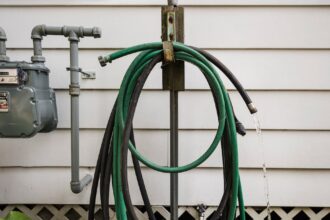The sky above downtown Kelowna stands empty now where a construction crane once reached toward the clouds. Four years have passed since that fateful July morning when the dismantling of a tower crane went catastrophically wrong, claiming five lives in seconds and leaving a community forever changed. Today, as family members place flowers at an understated memorial, union leaders are amplifying their calls for substantive reforms to prevent similar tragedies.
“Four years of grief without accountability is four years too many,” said Doug McKay, spokesperson for the International Union of Operating Engineers, during a somber press conference held near the accident site. “The families of those five men deserve more than memories and promises. They deserve justice and genuine systemic change.”
The 2021 collapse remains one of the deadliest construction accidents in recent Canadian history. Brothers Eric and Patrick Stemmer, Jared Zook, Cailen Vilness, and Brad Zawislak were killed when the crane collapsed during the dismantling process at a high-rise development project. An evacuation order affected nearby buildings, and the catastrophic incident sent shockwaves through British Columbia’s construction industry.
WorkSafeBC’s investigation, completed in 2023, identified multiple critical safety violations, including inadequate engineering oversight, improper dismantling procedures, and insufficient training for personnel involved. Despite these findings, criminal charges have yet to be filed against any parties.
“The evidence collected by WorkSafeBC shows clear negligence,” said workplace safety expert Dr. Helena Ramirez from the University of British Columbia. “When comparing similar incidents internationally, we see much faster accountability processes in places like the United Kingdom or Australia, where charges are typically filed within 18 months of workplace fatalities.”
The tragedy has prompted some regulatory changes. In March 2024, British Columbia implemented enhanced certification requirements for crane operators and mandatory third-party inspections during assembly and disassembly operations. The province also established a construction safety task force with a $3.5 million annual budget to increase site inspections.
For families of the victims, however, these measures feel insufficient without accountability for those responsible. Shelley Vilness, mother of 23-year-old Cailen, has become an outspoken advocate for construction safety reform.
“My son trusted that his workplace was safe,” Vilness told CO24 News. “The system failed him and four other men that day. No parent should have to wonder if their child will come home from work. These weren’t accidents—they were preventable failures.”
The BC Prosecution Service maintains that the case remains under active review, but has not provided a timeline for potential charges. Legal experts note that workplace fatality cases involve complex considerations regarding criminal negligence standards versus regulatory violations.
“The challenge in these cases is establishing criminal negligence beyond a reasonable doubt,” explained employment law attorney Martin Chen. “However, the extensive delay in this case is unusual even by those standards. The families deserve clarity on whether charges will be pursued.”
Industry statistics reveal concerning trends. According to WorkSafeBC data, serious incidents involving cranes increased 12% between 2020 and 2024, despite enhanced regulations. The construction sector accounts for approximately 30% of all workplace fatalities in the province, with nearly half involving equipment failures or improper procedures.
The International Union of Operating Engineers has proposed a “Crane Safety Act” that would establish mandatory minimum penalties for safety violations, create an independent investigation body, and provide whistleblower protections for workers who report unsafe conditions. The proposal has gained support from 27 municipalities across Canada but has yet to advance at the provincial level.
“We can’t bring back Eric, Patrick, Jared, Cailen, or Brad,” said McKay. “But we can honor them by ensuring this never happens again. That requires real accountability and laws with teeth, not just recommendations.”
As another anniversary passes, families and advocates continue their pursuit of justice while grappling with grief that never truly fades. The Kelowna skyline has changed with new developments rising where tragedy once struck, but for those most deeply affected, time stands still until accountability arrives.
In a system designed to protect workers, what must change before safety becomes more valuable than schedules and budgets in Canada’s construction industry?










